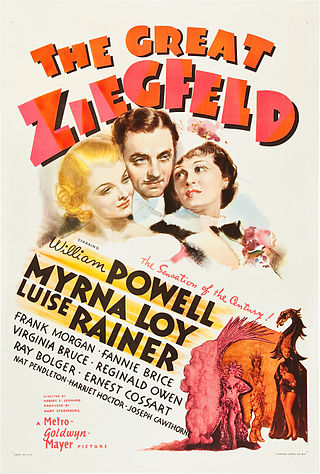
The Great Ziegfeld is a 1936 American musical drama film directed by Robert Z. Leonard and produced by Hunt Stromberg. It stars William Powell as the theatrical impresario Florenz "Flo" Ziegfeld Jr., Luise Rainer as Anna Held, and Myrna Loy as Billie Burke.

Irving Berlin was an American composer and songwriter. His music forms a large part of the Great American Songbook. Berlin received numerous honors including an Academy Award, a Grammy Award, and a Tony Award. He also received the Presidential Medal of Freedom from President Gerald R. Ford in 1977. Broadcast journalist Walter Cronkite stated he "helped write the story of this country, capturing the best of who we are and the dreams that shape our lives".
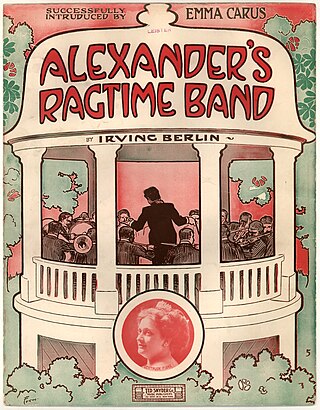
"Alexander's Ragtime Band" is a Tin Pan Alley song by American composer Irving Berlin released in 1911; it is often inaccurately cited as his first global hit. Despite its title, the song is a march as opposed to a rag and contains little syncopation. The song is a narrative sequel to Berlin's earlier 1910 composition "Alexander and His Clarinet". This earlier composition recounts the reconciliation between an African-American musician named Alexander Adams and his flame Eliza Johnson as well as highlights Alexander's innovative musical style. Berlin's friend Jack Alexander, a cornet-playing African-American bandleader, inspired the title character.

Jean Schwartz was a Hungarian-born Jewish American composer and pianist. He is best known for his work writing the scores for more than 30 Broadway musicals, and for his creation of more than 1,000 popular songs with the lyricist William Jerome. Schwartz and Jerome also performed together on the vaudeville stage in the United States; sometimes in collaboration with Maude Nugent, Jerome's wife, and the Dolly Sisters. Schwartz was married to Jenny Dolly from 1913 to 1921.
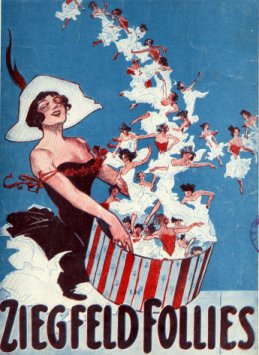
The Ziegfeld Follies were a series of elaborate theatrical revue productions on Broadway in New York City from 1907 to 1931, with renewals in 1934, 1936, 1943, and 1957. They became a radio program in 1932 and 1936 as The Ziegfeld Follies of the Air.
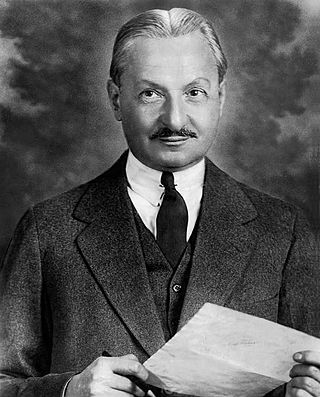
Florenz Edward Ziegfeld Jr. was an American Broadway impresario, notable for his series of theatrical revues, the Ziegfeld Follies (1907–1931), inspired by the Folies Bergère of Paris. He also produced the musical Show Boat. He was known as the "glorifier of the American girl". Ziegfeld is a member of the American Theater Hall of Fame.

Yip Yip Yaphank is a 1918 musical revue by Irving Berlin. He wrote and produced the show during World War I, after he was drafted into the United States Army and was serving in 152nd Depot Brigade at Camp Upton in Yaphank, New York. The military revue was performed by the soldiers of Camp Upton. It moved to Broadway after a brief tryout at the camp.

The 32-bar form, also known as the AABA song form, American popular song form and the ballad form, is a song structure commonly found in Tin Pan Alley songs and other American popular music, especially in the first half of the 20th century.
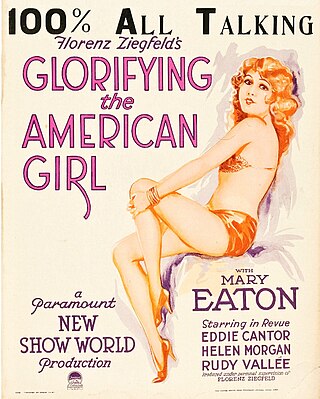
Glorifying the American Girl is a 1929 American pre-Code musical comedy film produced by Florenz Ziegfeld that highlights Ziegfeld Follies performers. The last third of the film, which was filmed in early Technicolor, is basically a Follies production, with appearances by Rudy Vallee, Helen Morgan, and Eddie Cantor.

The Passing Show of 1918 is a Broadway musical revue featuring music of Sigmund Romberg and Jean Schwartz, with book and lyrics by Harold Atteridge. The show introduced the hit songs "I'm Forever Blowing Bubbles" and "Smiles".
Louis Achille Hirsch, also known as Louis A. Hirsch and Lou Hirsch, was an American composer of songs and musicals in the early 20th century.

"You'd Be Surprised" is a song written by Irving Berlin in 1919 which Eddie Cantor interpolated it into Ziegfeld's Follies of 1919. Cantor soon recorded it and it became a major hit. Other popular versions in 1920 were by the All-Star Trio and by Irving Kaufman.

John W. Steel was an American tenor. He was featured in the Ziegfeld Follies of 1919 and 1920 and Irving Berlin's Music Box Revues of 1922 and 1923.

"Love Is Here to Stay" is a popular song and jazz standard composed by George Gershwin with lyrics by Ira Gershwin for the movie The Goldwyn Follies (1938).

"Supper Time" is a popular song written by Irving Berlin for the 1933 musical As Thousands Cheer, where it was introduced by Ethel Waters. The song is about racial violence inspired by a newspaper headline about a lynching.
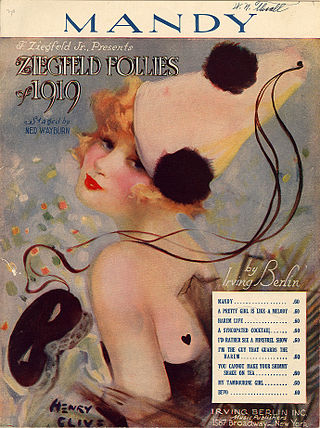
"Mandy" is a popular song by Irving Berlin, published in 1919.
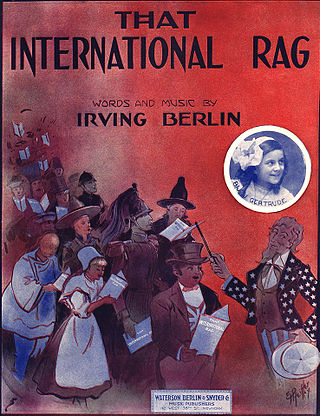
"That International Rag" is a song composed by Irving Berlin in 1913. Berlin wrote the song the night before its debut, when he needed a new opening number for his act while on tour in England.
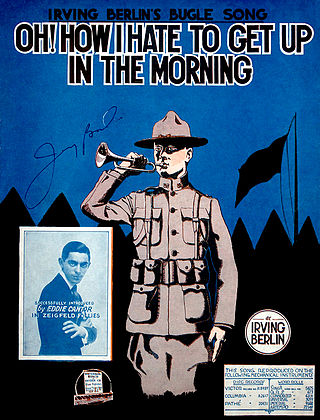
"Oh! How I Hate to Get Up in the Morning" is a song written by Irving Berlin in 1918 that gives a comic perspective on military life. Berlin composed the song as an expression of protest against the indignities of Army routine shortly after being drafted into the United States Army in 1918. The song soon made the rounds of camp and became popular with other soldiers, partly because hatred of reveille was universal.

Kay Laurell was an American stage and silent film actress and model.
The Ziegfeld Follies of 1919 was a revue produced by Florenz Ziegfeld Jr. Billed as the thirteenth edition of the Ziegfeld Follies series, it had a tryout at Nixon's Apollo Theatre in Atlantic City, New Jersey, on June 10, 1919 and opened at Broadway's New Amsterdam Theatre on June 16, 1919 and closed on December 6, 1919. It is often considered to be the best and most successful of the Follies series produced by Ziegfeld.



















